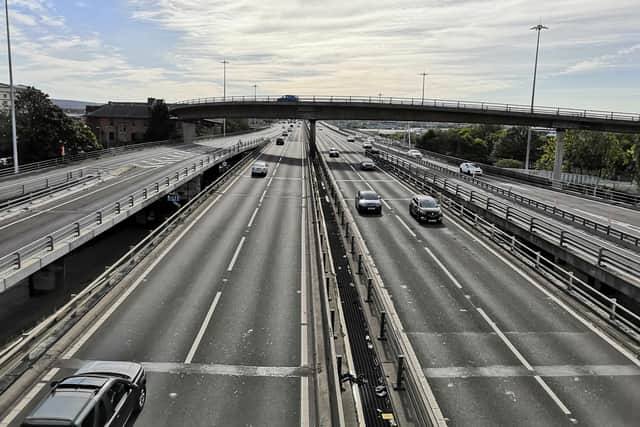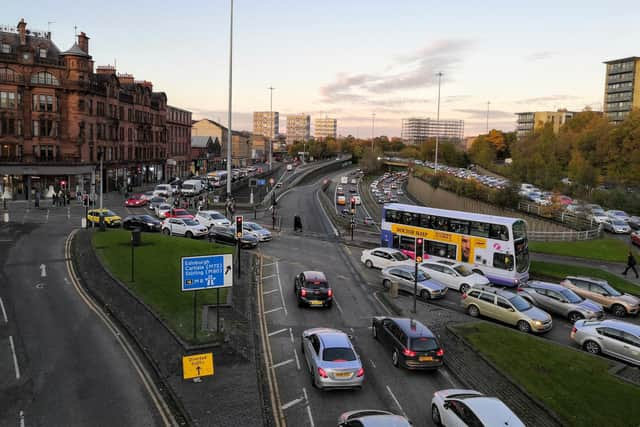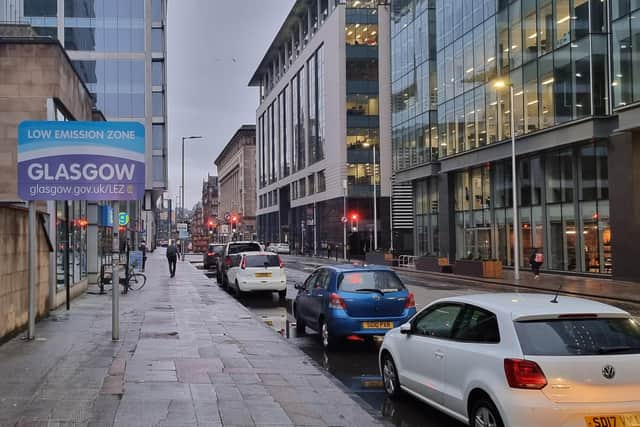LEZ Scotland: Car wars and conspiracy theories over low emission zones threaten goal for cleaner, greener, safer city centres, Glasgow academic says
If you judge winners and losers by body count, casualties and territory held, vehicles have the upper hand over people, says David MacArthur, a transport expert from the University of Glasgow.
Cars are one of the biggest serial killers in the world, responsible for multitudes of deaths via direct collisions and stealthy poisoning. So why is there such a backlash against measures aimed at cleaning up the air we breathe and cutting traffic in built-up areas?
Advertisement
Hide AdAdvertisement
Hide Ad“In part it’s because people seem to equate restrictions on cars with an attack on personal freedom,” MacArthur suggests.
Low emissions zones (LEZs) are aimed at improving air quality by restricting the types of vehicles which can enter an area based on the level of emissions they generate. But their introduction has been causing controversy here in Scotland and across the UK.
Glasgow became the first Scottish city to roll out such a scheme, beginning at the end of 2018 with restrictions on heavy vehicles like lorries and buses entering the city centre before extending the ban to the most polluting cars from June.
Edinburgh, Aberdeen and Dundee are due to follow suit next year.


Transport is responsible for the biggest share of the country’s territorial greenhouse gas emissions, accounting for just over a third of the total, with road traffic the main contributor. Air pollution has been named as the single largest environmental health risk in Europe and a major cause of premature death and disease worldwide, with transport again a key culprit.
Exposure to dirty air can lead to a wide range of diseases, including stroke, chronic obstructive pulmonary disease, trachea, bronchus and lung cancers, aggravated asthma and lower respiratory infections.
The World Health Organization (WHO) provides evidence of links to type 2 diabetes, obesity, systemic inflammation, Alzheimer’s disease and dementia, while the International Agency for Research on Cancer has classified air pollution as a leading cause of cancer.
A recent global review found chronic exposure can affect every organ in the body, complicating and exacerbating existing health conditions. Children and adolescents are particularly vulnerable because their bodies, organs and immune systems are still developing.
Advertisement
Hide AdAdvertisement
Hide Ad

Ella Roberta Adoo Kissi Debrah, a nine-year-old from London who died in 2013, became the first person in the world to have air pollution listed as a cause of death. The WHO estimates suggest around seven million people die prematurely across the globe each year as a result of breathing contaminated air, including up to 36,000 in the UK, with 2,500 of these in Scotland.
Two of the most dangerous pollutants are nitrogen dioxide (NO2) from traffic fumes and particulate matter (PM2.5) from vehicles, wood-burning, industry and farming. Meanwhile, about 1.3 million people die annually as a result of road traffic crashes, with another 50 million injured.
More than 1,700 were killed and nearly 29,000 hurt in the UK in 2022, including 174 deaths and close to 5,000 injured in Scotland. So it might seem surprising there is such strong feeling against moves to reduce pollution and prioritise people over motors.


MacArthur doesn’t own a car himself, but has a unique perspective on the measures.
Not only does he live right inside Glasgow’s LEZ, he holds the position of reader in transport studies at the University of Glasgow, where he helps train the urban planners of the future and crunches big data. He is shocked at the level of opposition to LEZs.
“People often say great things about cities they visited on holiday and how much they liked them,” he said. “The things they tend to like are not a six-lane highway running through the middle of it.
“It tends to be things like nice little streets, people sitting out on the pavements having coffee, lots of lovely little shops – these seem to be the kind of things humans enjoy in their surroundings, not the fact that it’s easy to drive around all day.
“I would encourage people to think about the things they can gain rather than a perceived reduction in what they are able to do.”
Advertisement
Hide AdAdvertisement
Hide Ad

Motor vehicles have only been around for just over 100 years, but driving has become a way of life.
The number of private cars on UK roads has increased from around four million in 1950 to 33.5 million today – not to mention all the buses, lorries and motorbikes. And towns and cities have adapted accordingly.
“The car is very much linked to freedom,” MacArthur said. “You have your car, your space, that takes you anywhere you want to go, and I think any discussion over the car’s place in society is immediately equated with an attack on freedom.
“But you could also talk about freedoms to breathe clean air, freedoms to walk, to cross a road and not have children getting asthma and so on. It’s a particular view on what freedom means, which has dominated for quite a while.
“We have set our society up with the idea that cars are how people will naturally be moving themselves around. After centuries, millennia, of humans without cars, we have changed society drastically in the last century to accommodate them. Now there’s a discussion – was that wise and perhaps do we want to strike a different balance?”
He worries LEZs have been weaponised for political purposes.
In September, shortly after announcing a delay to ending the sale of petrol and diesel cars in the UK, Prime Minister Rishi Sunak vowed to stop “hare-brained” traffic schemes and to “slam the brakes on the war on motorists”, with the UK Government confirming councils would be stopped from enforcing blanket 20mph speed limits.
Another target is “15-minute cities”, where healthcare, shopping, social and educational provisions are within easy walking or cycling distance, amid fears they “aggressively restrict where people can drive”.
Advertisement
Hide AdAdvertisement
Hide AdMacArthur said: “I think it has been quite fascinating to a lot of people in my transport planning world – especially the 15-minute and 20-minute neighbourhood concept, which seems the most unlikely territory for a conspiracy theory, but it’s quite wild how that has taken off.
“I find it quite hard to understand how something so benign has generated quite so much excitement about it.”
As well as cleaner air and safer streets, the researcher insists there are other benefits from restrictions on cars – like revitalising city centres.
“The way communities are set out has changed,” he said. “Out-of-town shopping centres, retail parks and the like are great if you have a car. You can drive there, park and go in, keep out of the Scottish weather.
“But they have not been good for city centres. I think a lot of people probably now look with sadness at the high streets and the lack of life on them.”
And LEZs can ramp up the transition to greener vehicles, which is happening naturally as the oldest and dirtiest reach the end of their lifespan.
“Vehicles tend to have got cleaner over time, so an LEZ kind of speeds up the rate at which the vehicle fleet renews itself,” he said. “It would have got to that stage anyway with people switching their older cars for newer ones.”
Comments
Want to join the conversation? Please or to comment on this article.